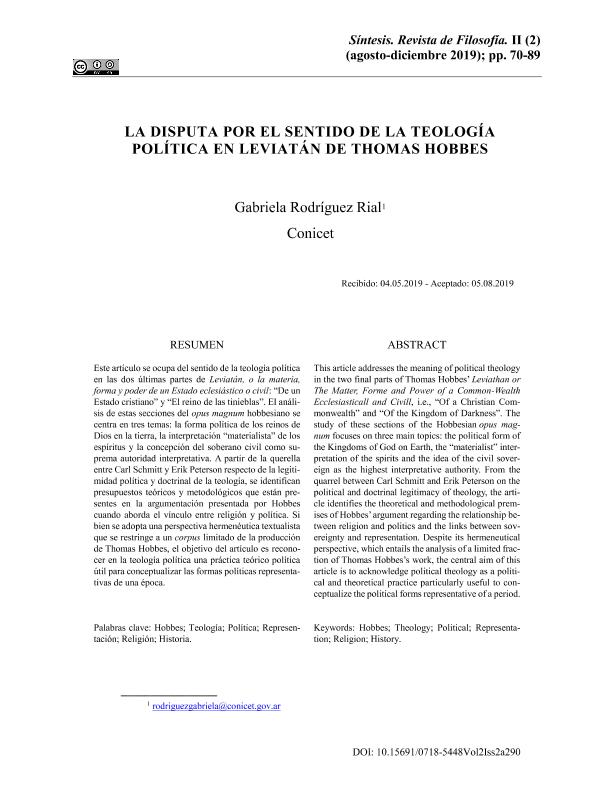Mostrar el registro sencillo del ítem
dc.contributor.author
Rodriguez, Gabriela

dc.date.available
2022-10-27T12:30:28Z
dc.date.issued
2019-12
dc.identifier.citation
Rodriguez, Gabriela; La disputa por el sentido de la teología política en Leviatán de Thomas Hobbes; Universidad Adolfo Ibañez; Síntesis; 2; 2; 12-2019; 70-89
dc.identifier.issn
0718-5448
dc.identifier.uri
http://hdl.handle.net/11336/175134
dc.description.abstract
Este artículo se ocupa del sentido de la teología política en las dos últimas partes de Leviatán, o la materia, forma y poder de un Estado eclesiástico o civil: "De un Estado cristiano" y "El reino de las tinieblas". El análisis de estas secciones del opus magnum hobbesiano se centra en tres temas: la forma política de los reinos de Dios en la tierra, la interpretación "materialista" de los espíritus y la concepción del soberano civil como suprema autoridad interpretativa. A partir de la querella entre Carl Schmitt y Erik Peterson respecto de la legitimidad política y doctrinal de la teología, se identifican presupuestos teóricos y metodológicos que están presentes en la argumentación presentada por Hobbes cuando aborda el vínculo entre religión y política. Si bien se adopta una perspectiva hermenéutica textualista que se restringe a un corpus limitado de la producción de Thomas Hobbes, el objetivo del artículo es reconocer en la teología política una práctica teórico política útil para conceptualizar las formas políticas representativas de una época.
dc.description.abstract
This article addresses the meaning of political theology in the two final parts of Thomas Hobbes’ Leviathan or The Matter, Forme and Power of a Common-Wealth Ecclesiasticall and Civill, i.e., “Of a Christian Commonwealth” and “Of the Kingdom of Darkness”. The study of these sections of the Hobbesian opus magnum focuses on three main topics: the political form of the Kingdoms of God on Earth, the “materialist” interpretation of the spirits and the idea of the civil sovereign as the highest interpretative authority. From the quarrel between Carl Schmitt and Erik Peterson on the political and doctrinal legitimacy of theology, the article identifies the theoretical and methodological premises of Hobbes’ argument regarding the relationship between religion and politics and the links between sovereignty and representation. Despite its hermeneutical perspective, which entails the analysis of a limited fraction of Thomas Hobbes’s work, the central aim of this article is to acknowledge political theology as a political and theoretical practice particularly useful to conceptualize the political forms representative of a period.
dc.format
application/pdf
dc.language.iso
spa
dc.publisher
Universidad Adolfo Ibañez
dc.rights
info:eu-repo/semantics/openAccess
dc.rights.uri
https://creativecommons.org/licenses/by-sa/2.5/ar/
dc.subject
HOBBES
dc.subject
TEOLOGÍA
dc.subject
POLÍTICA
dc.subject
REPRESENTACIÓN
dc.subject.classification
Ciencia Política

dc.subject.classification
Ciencia Política

dc.subject.classification
CIENCIAS SOCIALES

dc.title
La disputa por el sentido de la teología política en Leviatán de Thomas Hobbes
dc.type
info:eu-repo/semantics/article
dc.type
info:ar-repo/semantics/artículo
dc.type
info:eu-repo/semantics/publishedVersion
dc.date.updated
2022-10-27T10:21:29Z
dc.journal.volume
2
dc.journal.number
2
dc.journal.pagination
70-89
dc.journal.pais
Chile

dc.journal.ciudad
Viña del Mar
dc.description.fil
Fil: Rodriguez, Gabriela. Universidad de Buenos Aires. Facultad de Ciencias Sociales. Carrera de Ciencia Politíca; Argentina. Consejo Nacional de Investigaciones Científicas y Técnicas; Argentina. Universidad de Buenos Aires. Facultad de Ciencias Sociales. Instituto de Investigaciones "Gino Germani". Area Teoría Política; Argentina
dc.journal.title
Síntesis
dc.relation.alternativeid
info:eu-repo/semantics/altIdentifier/doi/http://dx.doi.org/10.15691/0718-5448Vol2Iss2a290
Archivos asociados
